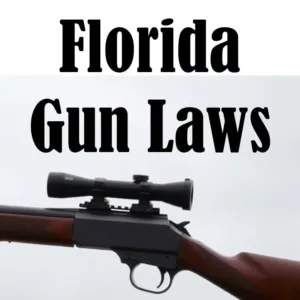Florida is known for its robust gun ownership culture, and its firearm laws are designed to balance Second Amendment rights with public safety concerns. Whether you are a Florida resident or just visiting, understanding the state’s gun laws is essential for lawfully owning, purchasing, or carrying firearms. This guide provides a detailed overview of Florida’s gun laws, covering permits, purchasing rules, concealed carry, and restricted locations.
Florida Gun Laws Overview
Open Carry in Florida
Unlike many states, open carry is largely prohibited in Florida. There are a few exceptions to this rule, including while engaged in certain activities such as hunting, fishing, camping, or target shooting. Outside of these activities, individuals must carry firearms concealed if they wish to carry them in public.

Who Can Legally Own a Firearm in Florida?
To legally own a firearm in Florida, you must:
- Be at least 18 years old to purchase rifles and shotguns.
- Be at least 21 years old to purchase handguns.
- Not be a convicted felon, unless your civil rights and firearm rights have been restored.
- Not have been convicted of domestic violence or be under a restraining order.
- Not have been adjudicated mentally defective or committed to a mental institution.
- Be a U.S. citizen or legal resident.
Purchasing a Firearm in Florida
In Florida, you do not need a permit to purchase a firearm, but all purchasers must undergo a background check through the Florida Department of Law Enforcement (FDLE). This applies to both handguns and long guns. The background check is conducted at the point of sale by the firearm dealer.
Handgun Purchases
- There is a three-day waiting period for handgun purchases in Florida, which applies to all sales from licensed dealers. This waiting period may be waived if the buyer has a valid Concealed Weapon or Firearm License (CWFL).
- The three-day waiting period does not apply to the purchase of rifles and shotguns.
Private Sales
- Private sales are not regulated in Florida, meaning individuals can sell firearms to one another without needing to conduct a background check or waiting period. However, it is illegal to sell a firearm to someone you know or reasonably believe to be prohibited from owning one.
Concealed Carry Permits in Florida
Florida is a shall-issue state, meaning that the state must issue a Concealed Weapon or Firearm License (CWFL) to any applicant who meets the eligibility requirements. Florida’s CWFL is one of the most popular permits in the U.S. due to its reciprocity with many other states.
How to Obtain a Concealed Weapon or Firearm License (CWFL):
- Be at least 21 years old.
- Complete an approved firearm safety and competency course.
- Submit an application through the Florida Department of Agriculture and Consumer Services.
- Pass a background check, including a fingerprint check.
- Pay the required application fee (around $97 for new applicants).
- Your CWFL will be issued within 90 days if all requirements are met.
The CWFL is valid for seven years and allows you to carry a concealed firearm and other weapons, such as stun guns and knives.
Where Can You Carry a Gun in Florida?
While Florida allows concealed carry with a CWFL, there are restrictions on where firearms can be carried. Some of the places where carrying a firearm is prohibited include:
- Schools: Firearms are not allowed on K-12 school property, including school events and transportation. Some exceptions exist for firearms left securely in a vehicle.
- Government Buildings: Firearms are prohibited in courthouses, police stations, detention facilities, and other government buildings.
- Colleges and Universities: Firearms are not allowed on college campuses, though some exceptions apply for firearms stored in locked vehicles.
- Bars and Restaurants: You cannot carry a firearm in the portion of an establishment primarily devoted to serving alcohol. However, you may carry in a restaurant that serves alcohol if you stay out of the bar area.
- Sporting Events: Firearms are prohibited at professional or collegiate sporting events.
- Polling Places: You may not carry a firearm at any location where voting takes place during an election.
Violation of these location-specific rules can lead to criminal charges, fines, and the loss of your right to carry a firearm.
Stand Your Ground and Castle Doctrine in Florida
Florida is known for its Stand Your Ground law, which allows individuals to use deadly force without a duty to retreat if they believe such force is necessary to prevent death, serious bodily harm, or the commission of a forcible felony. This law applies both inside and outside of one’s home.
Additionally, Florida’s Castle Doctrine permits the use of deadly force to protect oneself from an intruder in one’s home, vehicle, or place of work. There is no duty to retreat in these situations, and individuals are presumed to have a reasonable fear of harm if someone unlawfully enters their home or vehicle.
Restrictions on Firearms in Florida
While Florida has a strong culture of gun ownership, there are still restrictions on certain types of firearms and certain individuals:
- Convicted Felons: Felons cannot possess firearms unless their civil rights and gun rights have been restored.
- Domestic Violence Convictions: Those convicted of domestic violence or subject to restraining orders cannot own or possess firearms.
- Firearm Types: Florida does not have an assault weapons ban, but fully automatic weapons are regulated under federal law and require registration and a tax stamp.
- Suppressors: Suppressors (silencers) are legal in Florida, but they require federal approval and a tax stamp.
Reciprocity with Other States
Florida’s Concealed Weapon or Firearm License (CWFL) is recognized in many states, making it one of the most widely accepted permits in the U.S. However, it is essential to check the laws of the state you are traveling to, as gun laws vary widely between states.
Similarly, Florida recognizes concealed carry permits from many other states. However, residents of states that do not honor Florida’s permits are not allowed to carry in Florida, even if they have a permit from another state.
Penalties for Violating Gun Laws in Florida
Florida takes gun law violations seriously, and penalties can range from fines to imprisonment, depending on the offense. Some common violations include:
- Carrying a Concealed Firearm Without a Permit: This is a third-degree felony, punishable by up to five years in prison and a $5,000 fine.
- Possession of a Firearm by a Prohibited Person: Felons and those with domestic violence convictions can face severe penalties for firearm possession, including lengthy prison sentences.
- Carrying a Firearm in a Prohibited Location: Violating location restrictions, such as carrying a gun into a school or government building, can result in criminal charges and fines.
Conclusion: Stay Informed and Comply with Florida Gun Laws
Florida’s gun laws provide significant freedoms to lawful gun owners, particularly those with a Concealed Weapon or Firearm License (CWFL). However, there are important restrictions, especially regarding where firearms can be carried and who can legally possess them. Staying informed about the state’s gun laws and maintaining compliance will help ensure that you exercise your Second Amendment rights responsibly.
For those who plan to carry concealed, obtaining a CWFL is essential, not just for legal protection in Florida, but also for reciprocity in other states. Make sure to stay updated on the laws if you travel with firearms, as they can vary from state to state.
FAQs About Gun Laws in Florida
1. Is open carry legal in Florida?
No, open carry is generally prohibited in Florida, with a few exceptions for specific activities such as hunting or fishing.
2. Do I need a permit to carry a gun in my car in Florida?
No permit is needed to carry a firearm in your car as long as it is securely encased, such as in a glove compartment or a case. However, a CWFL is required to carry a firearm on your person in the vehicle.
3. What is the waiting period to buy a gun in Florida?
There is a three-day waiting period for handgun purchases from licensed dealers. This does not apply to long guns, nor does it apply to individuals with a valid CWFL.
4. Can non-residents carry concealed in Florida?
Non-residents with a concealed carry permit from a state that Florida recognizes may carry concealed in Florida, but they must follow Florida’s laws and restrictions.
5. What happens if I carry a firearm in a prohibited area?
Carrying a firearm in a restricted location, such as a school or government building, can result in criminal charges, fines, and possible imprisonment.
